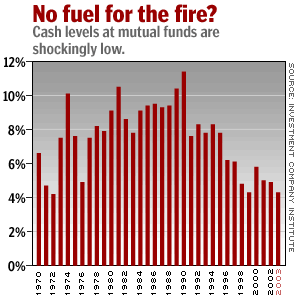NEW YORK (CNN/Money) - After watching the Dow Jones industrial average travel 750 points in less than four weeks, Wall Street is again wondering if the market is finally leading the bulls into a brand new day, or just another false dawn.
Hopes are high for the former. With the war apparently in its last throes, many investors believe that much of the uncertainty that's shackled American consumers and businesses will finally be loosed. When that happens, all the pent-up demand for things we've been suffering without -- 60 inch flat panel TVs for the home, new enterprise software for the office -- will push the economy back into solid growth.
But even in a future as bright as the optimists expect, the market may not have the fuel necessary to propel stocks higher. As of the end of February, cash as a percentage of total assets at mutual funds was just 4.3 percent. The only time it's been lower in the past 30 years was March 2000, when it hit 4 percent and the stock market began its long decline.

"That's not a lot of firepower," said Janney Montgomery Scott vice president Larry Rice. "I'd feel more comfortable if it was 8 or 9 percent."
With the dearth of cash in mutual fund hordes, the only way for the market to keep rising, thinks Rice, is if individual investors' aversion to stocks reverses itself. Last year, for the first time since 1988, equity mutual funds had net outflows. So far this year, they've continued to pull money out of the market.
In their newfound conservatism, individual investors have increasingly shifted cash toward money market funds. There's over $1 trillion in retail money market funds now, up from around $800 billion in early 2000, according to data from the Investment Company Institute. Many market participants have come to view that cash as the mother lode and are anxiously waiting for the day when it comes into the market.
It certainly could come back to market. As San Francisco Federal Reserve Bank senior economist Milton Marquis points out in a recent paper comparing current individual investor conservatism to the conservatism that took hold during the 1970s bear market, there have been a number of changes over the years that have made it easier for households to shift cash from one financial asset to another. For instance, much of the money that's fed into money-market funds (which weren't even an option for individual investors until the late 1970s) is through 401(k) plans and the like, meaning that investors can shift it back into equity funds at no cost.
Fools rush in?
But just because individual investors can easily shift money back into stocks doesn't necessarily mean that they will.
"I can't see them dashing back into equities," said James Montier, global investment strategist at Dresdner Kleinwort Benson. "People have to be feeling raw about the whole state of the economy. Are they really going to commit to stocks when they're not even sure about their jobs?"
At the very least, then, many individual investors may decide to hang fire while they wait to see if the economic renaissance that the stock market is forecasting is really going to happen. Until, say, the economy starts producing jobs again, the appeal of playing it safe will likely overrun the appeal of taking chances in the stock market.
Even then, individual investors may still shun equities. Many were tarred badly by the bull market and are still smarting. The S&P 500 is below where it was five years ago, meaning that almost all the money that's come to the market since then is under water. Considering how much more money came into the bull market in its late, rather than early, phases, and your talking about a lot of hurt.
Even if they can divorce themselves from the pain of their market losses, many investors are in no shape to push much money into stocks. They are poorer now, and closer to retirement, too -- a condition where one is better off taking fewer investment risks rather than more.
"People have been punished, punished badly," said John Bollinger, head of Bollinger Capital Management. "I don't think they're going to come in."

|

